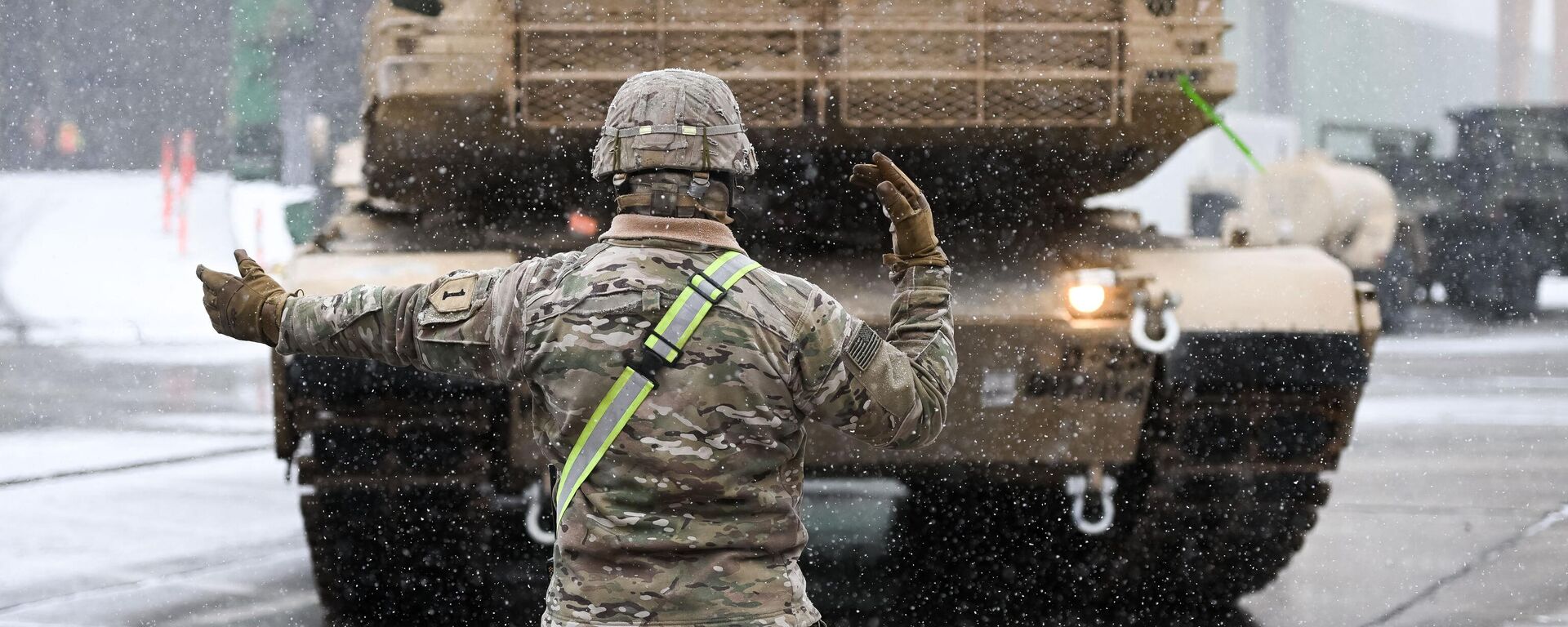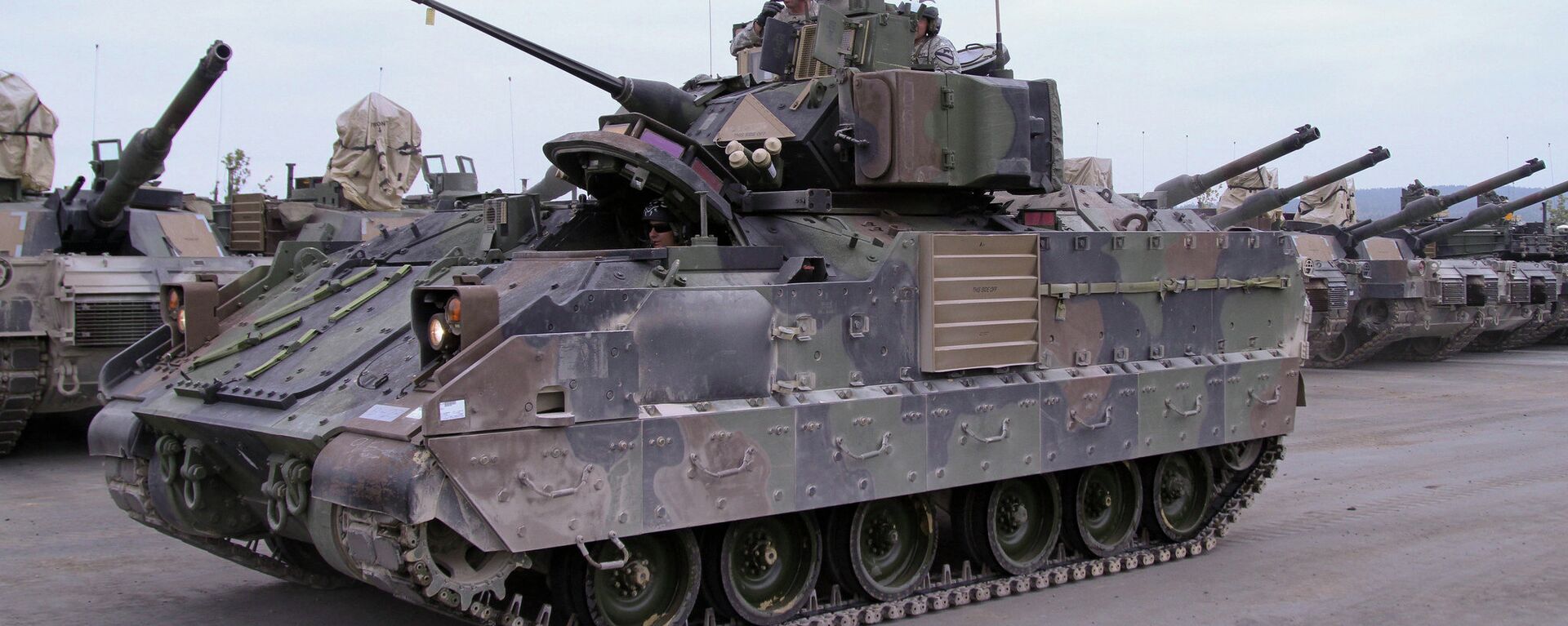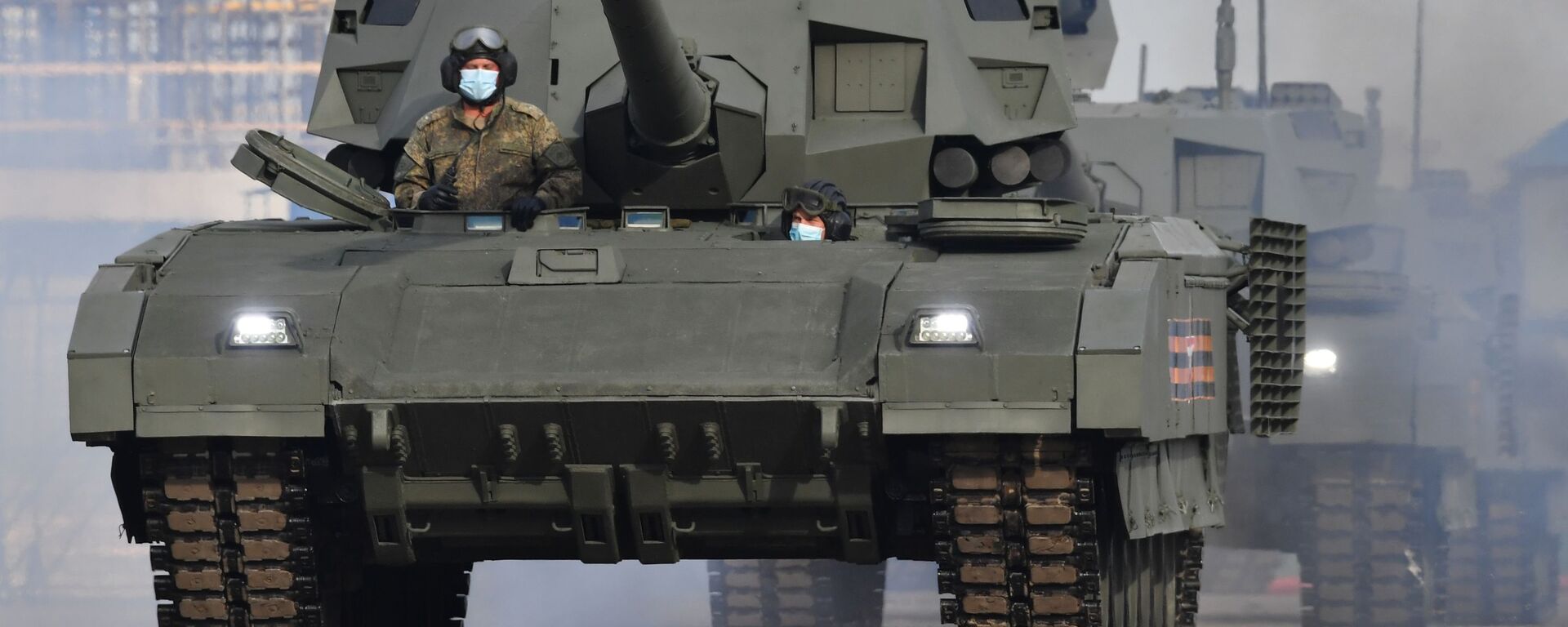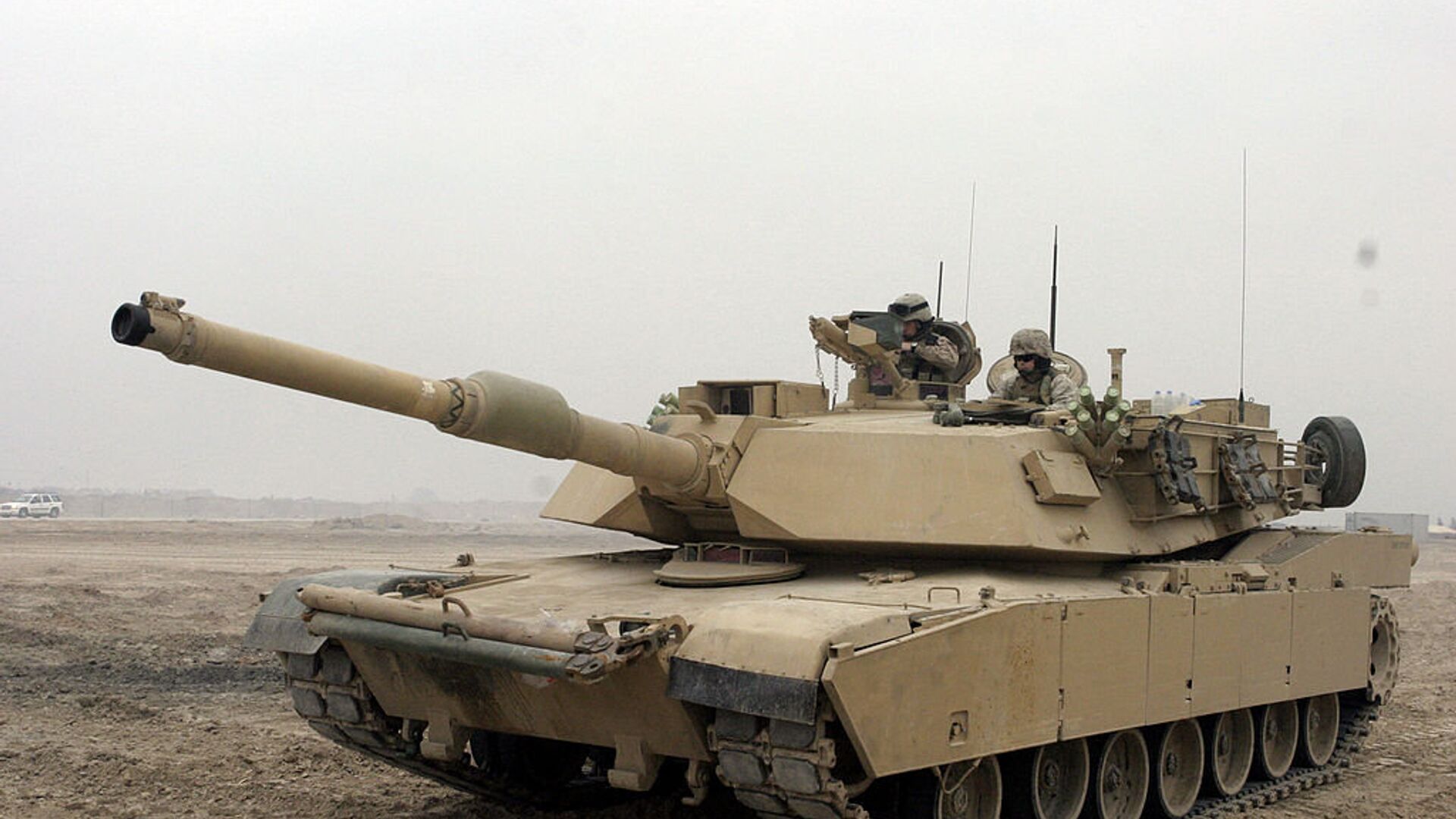https://sputnikglobe.com/20230124/what-is-the-m1-abrams-main-battle-tank-biden-wants-to-send-to-ukraine-1106666570.html
What is the M1 Abrams Main Battle Tank Biden Wants to Send to Ukraine?
What is the M1 Abrams Main Battle Tank Biden Wants to Send to Ukraine?
Sputnik International
The NATO allies waging a proxy war against Russia in Ukraine have rushed in recent weeks to send their most potent weapons yet to the battlefields in the Donbass: armored fighting vehicles and main battle tanks.
2023-01-24T20:49+0000
2023-01-24T20:49+0000
2023-01-25T15:39+0000
sputnik explains
m1 abrams tank
ukraine
main battle tank
https://cdn1.img.sputnikglobe.com/img/19173/69/191736959_0:54:1025:630_1920x0_80_0_0_83aef01983c5887d8cc692af7ee7d12c.jpg
After reports appeared in US media on Tuesday that the White House was preparing to send dozens of M1 Abrams main battle tanks (MBTs) to Kiev, the Pentagon said it was aware of the reports but had nothing to announce. US Army leaders have warned Ukrainians forces are ill-equipped to operate and maintain the advanced armored vehicles, making such a venture both costly and unproductive.However, it seems more likely than ever that Germany will allow Poland to send its Leopard 2 MBTs to Ukraine, and it’s unclear how that development will influence Washington’s thinking.Meeting the 'Heavy Threat' of Soviet ArmorThe M1 Abrams came out of attempts to develop a new kind of main battle tank that could stand toe-to-toe with the best Soviet armor, including the “heavy threat” posed by large and powerful high-explosive anti-tank (HEAT) rounds and armor-piercing sabot ammunition they could fire. The Vietnam War-era M60 Patton tanks could not take the heat - pardon the pun - so the US Army looked to develop the new MBT-70 in conjunction with the West German government.What came out of the design effort and entered service with the US Army in 1980 was one of the heaviest tanks ever built at 62 metric tons, but also one of the fastest. The MBT-70’s 1,500-horsepower gas turbine engine was put into the Abrams, giving it a road speed of 45 miles per hour and a cross-country top speed of 30 miles per hour. The newer versions are even heavier, at 74 tons, and a few miles per hour slower as a result.What Kind of Armaments Does the Abrams Have?This tank’s main gun was originally a 105-millimeter gun, but when the upgraded M1A1 debuted in 1986, it was upgraded to the same 120-millimeter smoothbore cannon used on West Germany’s Leopard 2 MBT. The Abrams also carries a 50-caliber machine gun and two M240 7.62-millimeter machine guns mounted on the turret.It is protected by Chobham-type composite armor that incorporates reactive armor and other new technologies. Later battlefield enhancements included the Tank Urban Survival Kit (TUSK), which gave it further reactive armor, slat armor, bulletproof glass in front of the machine guns, a remote-controlled machine gun, and an exterior infantry phone for troops to communicate with the tank driver.How Has It Performed in Combat?The Abrams has been sold to Egypt, Kuwait, Saudi Arabia, Australia, Poland, and Iraq, in addition to the US, but only the United States, Saudi Arabia, and Iraq have used the tank in combat.The Abrams’ debut was during Operation Desert Storm, the US war with Iraq in 1990 and 1991 that aimed to drive the Iraqi army out of Kuwait and cripple it. The tank performed admirably well against Iraq’s older Soviet-made T-55, T-62 and T-72 tanks and Chinese-made Type 69 tanks, including at the devastating Battle of 73 Easting, where its combination of night-vision targeting and extremely long combat range - in excess of 8,200 feet - made the difference. However, it’s likely the American’s superior training also played a role.The Saudi military has also used the Abrams during its invasion of Yemen that began in 2015. While the monarchy has made little comment about its effectiveness, the US sold Riyadh 153 more tanks just 1 year into the conflict, including 20 marked as "battle damage replacements,” suggesting Houthi resistance had succeeded in destroying several of them.How Much Does an Abrams Cost?According to US media, each tank costs between $6 million and $9 million. However, nations buying them, such as Poland earlier this month, also have to pay for complex maintenance support as well, meaning Warsaw paid about $19 million per tank.How Many Abrams Tanks Does the US Have?More than 10,000 Abrams tanks have been built overall, but according to Pentagon documents, the US Army has about 4,400 of them. The US Marine Corps formerly operated about 400 Abrams tanks as well, as a consequence of its shift toward land-based combat in the late 1980s, but have given them up as part of a move back toward an amphibious focus.
https://sputnikglobe.com/20230124/us-media-gives-thoughts-on-where-abrams-tanks-should-be-delivered-instead-of-ukraine--1106634666.html
https://sputnikglobe.com/20230123/what-is-the-bradley-infantry-fighting-vehicle-the-us-wants-to-send-to-ukraine-1106625750.html
https://sputnikglobe.com/20210225/russian-t-14-armata-tank-able-to-detect-targets-without-participation-of-crew-source-claims-1082179101.html
ukraine
Sputnik International
feedback@sputniknews.com
+74956456601
MIA „Rossiya Segodnya“
2023
News
en_EN
Sputnik International
feedback@sputniknews.com
+74956456601
MIA „Rossiya Segodnya“
Sputnik International
feedback@sputniknews.com
+74956456601
MIA „Rossiya Segodnya“
m1 abrams, tank, ukraine, biden administration
m1 abrams, tank, ukraine, biden administration
What is the M1 Abrams Main Battle Tank Biden Wants to Send to Ukraine?
20:49 GMT 24.01.2023 (Updated: 15:39 GMT 25.01.2023) Longread
The NATO allies waging a proxy war against Russia in Ukraine have rushed in recent weeks to send their most potent weapons yet to the battlefields in the Donbass: armored fighting vehicles and main battle tanks.
After reports appeared in US media on Tuesday that the White House was
preparing to send dozens of M1 Abrams main battle tanks (MBTs) to Kiev, the Pentagon said it was aware of the reports but had nothing to announce. US Army leaders have warned Ukrainians forces are ill-equipped to operate and maintain the advanced armored vehicles, making such a venture both costly and unproductive.
However, it seems more likely than ever that Germany will allow Poland to send its Leopard 2 MBTs to Ukraine, and it’s unclear how that development will influence Washington’s thinking.
Meeting the 'Heavy Threat' of Soviet Armor
The M1 Abrams came out of attempts to develop a new kind of main battle tank that could stand toe-to-toe with the best Soviet armor, including the “heavy threat” posed by large and powerful high-explosive anti-tank (HEAT) rounds and armor-piercing sabot ammunition they could fire. The Vietnam War-era M60 Patton tanks could not take the heat - pardon the pun - so the US Army looked to develop the new MBT-70 in conjunction with the West German government.
The MBT-70 was an over-budget disaster as a result of repeated redrafting and it was abandoned in 1971. When the M1 program began in early 1973, it largely started afresh, and was heavily informed by the extensive tank combat seen in
the Yom Kippur War that October, which highlighted the dangers of newer hand-mounted anti-tank weapons.
What came out of the design effort and entered service with the US Army in 1980 was one of the heaviest tanks ever built at 62 metric tons, but also one of the fastest. The MBT-70’s 1,500-horsepower gas turbine engine was put into the Abrams, giving it a road speed of 45 miles per hour and a cross-country top speed of 30 miles per hour. The newer versions are even heavier, at 74 tons, and a few miles per hour slower as a result.

24 January 2023, 06:09 GMT
What Kind of Armaments Does the Abrams Have?
This tank’s main gun was originally a 105-millimeter gun, but when the upgraded M1A1 debuted in 1986, it was upgraded to the same 120-millimeter smoothbore cannon used on West Germany’s Leopard 2 MBT.
The big gun’s main ammunition is the M829A2 armor-penetrating round, which is made using
depleted uranium, but it can fire a variety of other rounds, including the M1028 120 mm anti-personnel canister cartridge, which turns the tank into a colossal shotgun.
The Abrams also carries a 50-caliber machine gun and two M240 7.62-millimeter machine guns mounted on the turret.
It is protected by Chobham-type composite armor that incorporates reactive armor and other new technologies. Later battlefield enhancements included the Tank Urban Survival Kit (TUSK), which gave it further reactive armor, slat armor, bulletproof glass in front of the machine guns, a remote-controlled machine gun, and an exterior infantry phone for troops to communicate with the tank driver.

23 January 2023, 19:44 GMT
How Has It Performed in Combat?
The Abrams has been sold to Egypt, Kuwait, Saudi Arabia, Australia, Poland, and Iraq, in addition to the US, but only the United States, Saudi Arabia, and Iraq have used the tank in combat.
The Abrams’ debut was during Operation Desert Storm, the US war with Iraq in 1990 and 1991 that aimed to drive the Iraqi army out of Kuwait and cripple it. The tank performed admirably well against Iraq’s older Soviet-made T-55, T-62 and T-72 tanks and Chinese-made Type 69 tanks, including at the devastating Battle of 73 Easting, where its combination of night-vision targeting and extremely long combat range - in excess of 8,200 feet - made the difference. However, it’s likely the American’s superior training also played a role.
During the later US occupation of Iraq, the Abrams struggled with urban combat, where close-in fighting during ambushes resulted in dozens of tank losses. The TUSK modifications were introduced in response, but more than 80 Abrams had been destroyed by then and 530 more had been forced back to the US for extensive repairs.
The Saudi military has also used the Abrams during its invasion of Yemen that began in 2015. While the monarchy has made little comment about its effectiveness, the US
sold Riyadh 153 more tanks just 1 year into the conflict, including 20 marked as "battle damage replacements,” suggesting Houthi resistance had succeeded in destroying several of them.

25 February 2021, 04:13 GMT
How Much Does an Abrams Cost?
According to US media, each tank costs between $6 million and $9 million. However, nations buying them,
such as Poland earlier this month, also have to pay for complex maintenance support as well, meaning Warsaw paid about $19 million per tank.
How Many Abrams Tanks Does the US Have?
More than 10,000 Abrams tanks have been built overall, but according to Pentagon documents, the US Army has about 4,400 of them. The US Marine Corps formerly operated about 400 Abrams tanks as well, as a consequence of its shift toward land-based combat in the late 1980s, but have given them up as part of a move back toward an amphibious focus.




